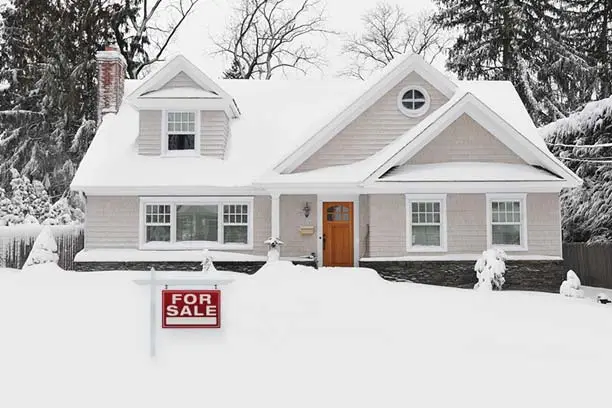A Guide to Buying or Selling a Home in Winter


Late spring and early summer are traditionally the busy times for real estate. That’s when the weather is getting nicer and the days are getting longer in a lot of the country. People can feel more confident that they won’t have to move during snowy or icy weather. And families with children can get settled into their new home before the school year starts.
But that timeframe doesn’t always work for everyone. If you’re buying or selling a house in the winter, here’s what to know.
Do houses sell in the winter? Yes, and you won’t have as much competition, so people who are buying a house in the winter may be more flexible about what they choose. Winter home buyers are probably more serious — they aren’t just “looking.” But there’s a downside — you might not sell your house for as much money in the winter as in the summer.
Curb appeal can be tougher for real estate in the winter. You might not have the benefit of green leaves on your trees and blooming flowers that add color, so do what you can to make your outdoor space tidy and inviting. Clean up any leaves or debris, add seasonal wreaths or decorations, and consider hanging up some string lights to add warmth.
For the indoors, brighten up your spaces with lots of light — turn on all your lamps and overhead lighting. For daytime showings or open houses, open your shades and curtains. If you’re not living in the house, make sure the heat is on — buyers won’t warm up to a chilly space.
Is winter a good time to buy a house? Buyers may be at an advantage in the winter. The lower prices that often come along with this home-buying season mean you may get a good deal on the house you want.
And there’s not as much pressure. In peak season, real estate agents might be accepting offers within days after listing a house. You might have a little more time to think and negotiate in winter.
In colder climates, the weather can cause some hassles. It may be harder for inspectors and appraisers to get to the property. You might not be able to get a good sense of what the yard and landscaping look like in bloom.
You might need some flexibility with your move date if it’s snowing, icy or bitterly cold. However, you’re more likely to find movers who are willing to work with you, since they aren’t as busy in the winter.
For buyers, it depends on your priorities. Spring and early summer may give you the best selection, while winter might give you the best price. The opposite is true if you’re selling — you might get top dollar in spring or summer, but find fewer, more motivated buyers in the winter, which could simplify the process.
Keep in mind that when it comes to real estate markets, location is the main factor to consider. You might be buying or selling in a place where houses get snatched up in days, with multiple offers over the asking price. Or your market may have a lot of homes for sale so you can expect the process to take longer.
And of course, you can often be both the buyer and the seller at the same time. If you’re moving to a bigger home as your family grows, downsizing to a space that meets your needs or relocating to a different area, you might be selling one house and buying another.
When you’re moving to a new house, you’ll want to make sure you’re protecting your investment from day one. Take one thing off your moving to-do list ahead of time — set up a meeting with a Farm Bureau insurance agent to make sure you have the homeowner’s insurance you need in place on your move-in date.